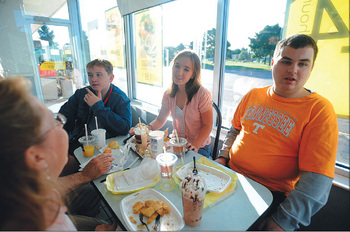Autistic teens often feel overwhelmed and anxious in social situations due to an overactive part of their brain, according to new findings from the University of Michigan released Tuesday.
Autism is a group of developmental brain disorders that refer to a wide range of levels of impairment and symptoms including social impairment, communication difficulties and repetitive and stereotyped behaviors.

From left: Whiteman siblings Ben, age 15, Julianna, age 19, and Daniel, age 19, enjoy a family breakfast in Ypsilanti in 2010. Daniel, who has autism, is in a program which has helped him cope with situations which used to cause him great anxiety. University of Michigan researchers have found that a part of the brain in teens who are autistic is often over-active in social situations, which causes them to feel overwhelmed.
Angele Cesere | AnnArbor.com file photo
The study monitored 32 children and teens with autism and 56 youth without autism through MRI imaging while the subjects were exposed to a set of facial images with different expressions.
Teens diagnosed with autism spectrum disorders did not adjust as well to new faces as non-autistic teens, according to the study.
In the youth not diagnosed with autism, researchers found activity in the amygdala decreased during the session as the children were shown image after image of the faces.
For autistic youth, activity in the amygdala was sustained throughout the entire session, which U-M researchers say means habituating to a certain situation is much more difficult.
Habituation is the process by which the brain becomes accustomed to a certain situation -- in the same way that a person could tune out a clock ticking in a room, according to the researchers.
“We could imagine how distressing failure to habituate would be in that case. Amygdala habituation helps us become accustomed to familiar social situations so we're not always on alert. This study is one of the first to show that this process is altered in teens with autism spectrum disorders,” according to a statement from the lead author of the study, Johnna Swartz, a graduate student in U-M's Department of Psychology.
Continued arousal and reaction to a situation often leads to distress, researchers say.
“They may find it distressing to look at and interact with other people. If kids find it distressing to watch and engage in social situations from an early age, they will disengage from them and miss many opportunities to learn about the social world,” said Christopher Monk, a professor in U-M’s Department of Psychology and a research associate professor at the Center for Human Growth and Development.
Amy Biolchini covers Washtenaw County, health and environmental issues for AnnArbor.com. Reach her at (734) 623-2552, amybiolchini@annarbor.com or on Twitter.